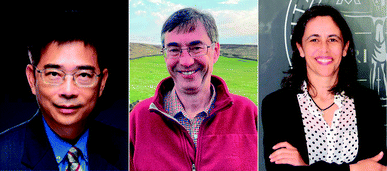 Open Access Article
Open Access ArticleCreative Commons Attribution 3.0 Unported Licence
Editorial introducing Environmental Science: Advances
Zongwei
Cai
 a,
Kevin C.
Jones
a,
Kevin C.
Jones
 *b and
Celia M.
Manaia
*b and
Celia M.
Manaia
 c
c
aHong Kong Baptist University, Hong Kong, China
bLancaster Environment Centre, Lancaster University, U. K.
cUniversidade Católica Portuguesa, Portugal
We would like to take this opportunity to introduce the journal (its purpose, aims and scope), our plans to make it distinctive, and to explain why it will be a great place to publish your best work.
So, why do we believe there should be another journal focussed on the environmental sciences and what will make it distinctive?
Careful and responsible stewardship of the environment is arguably the most important issue facing mankind this century. Achieving local, regional and global scale changes are enshrined in the United Nations Sustainable Development Goals, which the world’s nations have committed to trying to deliver (https://sdgs.un.org/goals). Delivering clean and safe water, clean air, global food security, maintaining biodiversity, limiting climate change, environmental pollution, responsible consumption and production, care of the planet’s natural resources, good health and wellbeing, and poverty eradication are ‘grand challenges’ which we all face now and in the coming decades. This requires sound science, technical improvements, societal and political changes and needs innovative, multi-disciplinary and ambitious approaches. Typically, scientists tend to publish their research in specialist journals of their own discipline. However, now research is often conducted by cross-disciplinary, inter-disciplinary and trans-disciplinary teams to address the issues in the environmental sciences, grand challenges and to provide solutions. This is where this new journal is being positioned.
So, Environmental Science: Advances welcomes research from any discipline that will contribute to an increased understanding of the environment, and to the advancement of several UN Sustainable Development Goals – original thinking to take on the world’s biggest challenges. Our vision is for Environmental Science: Advances to be a truly interdisciplinary journal, which welcomes research from any field related to the environmental sciences, global environmental change, and sustainability science. Inclusive collaboration across research disciplines is important for scientific advancement and, as such, we welcome studies from a broad range of topics, including biosciences, engineering, ecology, hydrology, soil science, geoscience, atmospheric science, agricultural science, climate science and the social science interface. Studies that advance our understanding of the physical environment, environmental health, and environmental sustainability, or provide solutions to challenges in these areas, are particularly welcome. Fundamental research with environmental advancement is also welcomed, alongside modelling, fieldwork, applied studies, policy work and studies at the interface of environmental and social science.
The RSC is a not-for-profit professional society, with both a strong track record in providing professionalism and lots of support to authors, and a long tradition of publishing in the environmental sciences area. They are committed to upholding a reputation for quality, rigour, and excellence, while supporting a smooth, fair and sustainable transition to open access publishing. Environmental Science: Advances will certainly be key in any such transition to open access.
Emma Eley is the journal’s Executive Editor, and leads the strategic development of the journal. She is assisted by Jon Ferrier, Deputy Editor, and they both work closely with a team of Assistant Editors who promote the journal, invite authors to publish, and support authors and reviewers at every stage of the publication process.
Perhaps Emma and the team have reached out to you already – they would be delighted to hear from you about what you’re working on (email: E-mail: ESAdvances-rsc@rsc.org) and to talk you through the benefits of publishing with us. These are several; from rapid publication times – across all RSC journals, papers are published online on average less than 9 weeks after submission, with a first decision typically within 35 days – to our partnership with ChemRxiv™ allowing streamlined, direct submission of pre-prints to the journal, to benefitting from open access publication without the cost as all article processing charges (APCs) are being waived until mid-2024.
Working together to support the environmental science community
The RSC’s existing environmental science journals all have chemistry at their core, while – as we just explained – Environmental Science: Advances has a broader base and remit, combining this with the advancement in sustainable development. There are four sister journals in the Environmental Science family – Environmental Science: Processes & Impacts (ESPI), Environmental Science: Nano (ESN), Environmental Science: Water Research & Technology (ESWRT) and Environmental Science: Atmospheres (ESA). Each has a clear focus. ESPI publishes work on environmental chemistry in natural systems, ESN publishes studies on the environmental chemistry and applications of engineered nanoparticles, ESWRT publishes studies on the science and engineering of water in the built environment, and ESA publishes work on atmospheric science and related challenges. We will work together with the Editors on our sister journals to ensure that we provide the research community with a home for their work across all disciplines of the environmental sciences. More details about the family of journals can be found at http://rsc.li/envsci.In addition to working with our sister journals, we will of course be working closely with our newly formed Editorial Board, who will be handling the peer review of submissions to the journal as well as steering the future strategic direction of the journal with us. We are delighted that Pernilla Bohlin-Nizzetto (Norwegian Institute for Air Research, Norway), Ru-Jin Huang (Chinese Academy of Sciences, China), Silvia Lacorte (IDAEA-CSIC, Spain), Joe Ryan (University of Colorado Boulder, USA) and Liwu Zhang (Fudan University, China) have joined the Editorial Board of the journal and we look forward to further building our journal community by expanding our Advisory Board with new members over the coming months.
We look forward to bringing you lots of exciting environmental research in the journal in 2022 and beyond, and welcome you as potential future authors, reviewers and readers.
Zongwei Cai, Kevin C. Jones and Celia M. Manaia
Editors-in-Chief
March 2022
| This journal is © The Royal Society of Chemistry 2022 |

